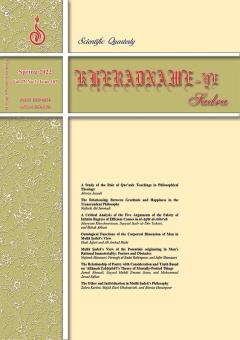A Critical Analysis of the Five Arguments of the Falsity of Infinite Regress of Efficient Causes in al-Asfār al-Arba‘ah
Subject Areas : ملاصدراپژوهی و اندیشۀ حکمت متعالیهMaryam Khoshnevisan 1 , Seyyed Sadr al-Din Taheri 2 * , Babak Abbasi 3
1 - PhD candidate of Islamic Philosophy and Kalam, Faculty of Law, Theology, and Political Science, Islamic Azad University, Science and Research Branch, Tehran, Iran
2 - Professor at Philosophy Department of Allameh Tabataba’i University, Tehran, Iran
3 - Assistant Professor, Philosophy Department, Faculty of Law, Theology, and Social Science, Islamic Azad University, Science and Research Branch, Tehran, Iran
Keywords: Causality, infinite regress, active causes, argument of limit and middle, argument conformity, argument of the most concise and precise, argument of correlation, al-Asfār al-Arba‘ah, Mullā Ṣadrā,
Abstract :
This study investigates and criticizes five of Mullā Ṣadrā’s main arguments for the falsity of the infinite regress of efficient causes. Given the fact that many philosophers use this principle in order to demonstrate the existence of the Necessary Being, a study of the objections targeting its arguments is of great importance because of its relationship with proving the existence of God. In order to achieve the purpose of this study, four arguments have been examined and criticized separately, and the fifth argument has been referred back to the fourth in terms of content and method. These arguments include “limit and middle”, “conformity”, “the most concise and precise”, “correlation 1”, and “correlation 2” arguments. The criticisms of the arguments of the falsity of regress and the importance of the falsity of the regress of efficient causes in developing some of the arguments adduced to demonstrate the Divine Essence have provoked philosophers, both Islamic and Western, to seek for other arguments to prove the existence of God in order not to rely on the falsity of the regress of causes. It is worth noting that they have had some success in this regard. At the end of this paper, without discussing the arguments and while summarizing and concluding the remarks, the authors refer to two famous arguments: Mullā Ṣadrā’s argument of the righteous in Islamic philosophy and Anselm’s ontological argument in Western philosophy. These two arguments are semi-casual and semi-analytical because they are not based on any premise that needs to be proved.
ابنسينا (1363) الهيات شفا، تصحيح اُب قنواتي و سعيد زايد، تهران: افست.
ابنسينا (1403ق) الاشارات و التنبيهات، بهمراه شرح خواجهنصيرالدين طوسي، ج2، تهران: دفترنشركتاب.
جوادي آملي، عبدالله (1393) رحيق مختوم، شرح حكمت متعاليه، تحقيق و تدوين حميد پارسانيا، ج8، قم: اسراء.
خوانساري، آقا حسين (بيتا) الحاشية علي الهيات الشفاء، تصحيح حامد ناجي اصفهاني، اصفهان: كنگره بزرگداشت آقا حسين خوانساري.
سبزواري، ملاهادي (1413ق/ 1992م) غرر الفرائد (شرح منظومة حكمت)، ج 1/2، تهران: ناب.
طباطبايي، سيدمحمدحسين (1360) بداية الحكمة، بهمراه ترجمه و شرح علي شيرواني، قم: بوستان كتاب.
طباطبايي، سيدمحمدحسين (1376) نهاية الحكمة، بهمراه حواشي محمدتقي مصباح يزدي، ج 2، تهران: الزهرا.
طباطبايي، سيدمحمدحسين (1385) نهايةالحكمة، بهمراه حواشي غلامرضا فياضي، ج3، قم: مؤسسه آموزشي و پژوهشي امام خميني.
طباطبايي، سيدمحمدحسين (بي تا) بدايةالحكمة، نشريه شماره2 مدرسة منتظرية قم، قم: طباطبايي.
فخررازي (1428ق) المباحث المشرقية، ج1، تحقيق و تعليق محمدالمعتصم بالله البغدادي، قم: ذويالقربي.
مطهري، مرتضي (1370) دروس الهيات شفا، ج2، تهران: حكمت.
ملاصدرا (1380) الحكمة المتعالية في الاسفارالاربعة، ج2، تصحيح و تحقيق مقصود محمدي، تهران: بنياد حكمت اسلامي صدرا.

